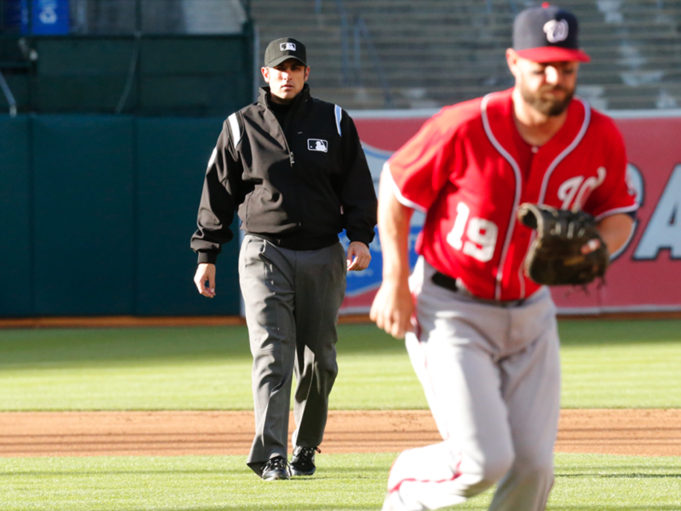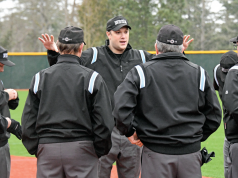I’ve always felt the following are some of the greatest sayings relating to speaking: “You can’t be misquoted for something when you say nothing.” “When speaking, try not to step on your own tongue.” “A still tongue makes a wise head.” “Speech is silver, silence is golden.” “A word to the wise is enough.”
In today’s game, umpires who choose to follow those proverbs will likely benefit a great deal.
Unlike many other sports, baseball tends to be a social game with a considerable amount of lull time between plays during each contest. That creates opportunities and temptations for conversations to take place with players during the game. For base umpires particularly, submitting to such enticements is risky. Coaches and players from both dugouts, as well as fans in the stands, can’t help but notice when such talking takes place. Undoubtedly, some will wonder how what is being discussed will impact your next call, especially if the conversing takes place frequently over several innings.
Umpires don’t want to be construed as aloof and unfriendly, so responding tersely and politely to appropriate comments directed at them by players is the proper thing to do. However, where we err is when we originate the conversation, or when the talking becomes habitual and/or lengthy. A notable exception to that rule of avoiding initiating conversation with players can come occasionally right after a great defensive play is made. A briefly stated, “Great play, young man,” is completely appropriate in those circumstances and usually won’t violate the social boundaries between player and umpire that help maintain the integrity of the game.
For plate umpires, there is a divergence of opinion on the value of considerable speaking with catchers during a game. I’m one who doesn’t feel comfortable talking a lot with catchers. In fact, beyond the expected handshake and introduction prior to looking at some of the first warmup pitches, I’m usually more comfortable with the less said, the better. I will usually ask the catcher during those warmup pitches if there is anything about his pitcher that he would like me to know. I will also answer occasional appropriately asked questions about location from catchers when I call a ball on a marginal pitch. However, if it begins to become frequent, such that I believe he is critiquing the call, I put a quick end to it. A concise statement such as, “I’m not back here to do play by play,” will usually get the point across.
There are times in games when we definitely have to talk to players to prevent sparks from exploding into all-out conflagrations. Issuing warnings on pitches thrown high and tight comes to mind, as does telling a hitter to start running the bases while he is admiring a towering drive he just blasted deep to the outfield. An entire article could be devoted to such situations. Even in those situations, the less that can be said to make your point while using appropriate language will always be most effective.
Gone are the days when profanity could be used to make a point with players during a game. We live in an era of technological advancements in communications and media that make it almost impossible for something questionable to be said on the diamond that goes unnoticed, unrecorded or unreported. Consequently, it’s in our own best interest as umpires to be very discreet in what we say to players and how we say it.
I expect my partners to have my back, and I definitely will have theirs, when a player decides he is going to blast one of us during a game. A common situation is when a base umpire is in the middle of the diamond and one of the middle infielders decides to vociferously complain about pitches that he believes his pitcher is not getting called for strikes. My belief is that you must address the player in such circumstances. However, I try to be as dispassionate as possible when I tell players that I consider yelling at my partner the same as yelling directly at me. I will then remind them that their coach and teammates would like them to remain in the game, and their current behavior is casting doubt on the likelihood of that happening.
It is always good to remember that talk is cheap. Our job performance is usually not determined by what we say on the diamond, unless the evaluation is negative due to our words getting us in trouble. Another favorite idiom of mine is, “Some things are better left unsaid.”
What's Your Call? Leave a Comment:
Note: This article is archival in nature. Rules, interpretations, mechanics, philosophies and other information may or may not be correct for the current year.
This article is the copyright of ©Referee Enterprises, Inc., and may not be republished in whole or in part online, in print or in any capacity without expressed written permission from Referee. The article is made available for educational use by individuals.


















